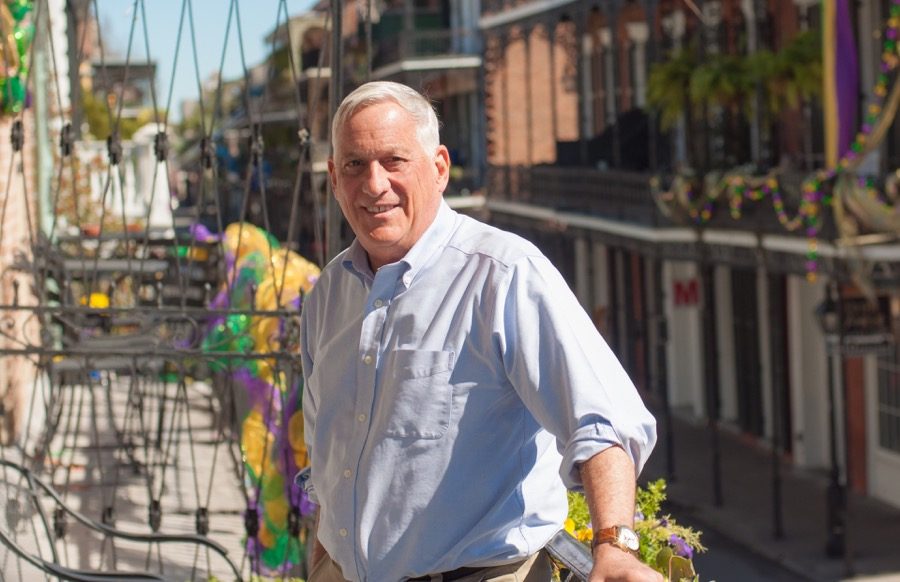CEO, best-selling author Walter Isaacson to join Tulane faculty
New Orleans native Walter Isaacson, current president and CEO of the Aspen Institute in Washington, D.C. and Tulane board member, will join Tulane’s Department of History next spring.
Isaacson, who is also the former chairman and CEO of CNN, managing editor of Time magazine, Times-Picayune reporter, best-selling author and political appointee, was born in New Orleans to two Tulane graduates. Isaacson served as student body president at the Isidore Newman School Uptown and went on to graduate from Harvard University.
After pursuing a fast-paced lifestyle in Washington D.C., Isaacson decided to return home to New Orleans, a city he said he feels will offer him the freedom to innovate. On making the switch from the District to the Big Easy, Isaacson said “there is more creativity in every neighborhood of New Orleans than there is in the whole city of Washington.”
As a member of Tulane’s history department, Isaacson will teach a course entitled “The History of the Digital Revolution: From Ada Lovelace to Mark Zuckerberg” in the spring 2018 semester. His most recent work, “The Innovators: How a Group of Hackers, Geniuses and Geeks Created the Digital Revolution,” highlights a parallel between the growth of modern technology and the evolution of jazz. Both are art forms in a constant state of improvisation, blending different histories, personalities and visions to forge a powerful connective experience.
The changing nature of the digital sphere and the connections between technology and New Orleans culture make Isaacson’s class compelling for Tulane students.
“People say to succeed in the 21st century, you’re going to have to know software engineering,” Isaacson said. “I think that it’s far more important to know history because the software will change, and the knowledge of history will tell you why it’s changing.”
In light of rapid technological advancement, Isaacson warns of the dangers presented by pursuing such change without historical context. Without a background in history, he argues, understanding the implications of digital development may prove difficult.
Isaacson’s experience working in the media, policy and biographical work inform his position that the study of history must be collaborative and fluid.
“In covering Ben Franklin, there may have been ten thousand letters, diaries and contemporary accounts that you need to study,” Isaacson said. “In covering the most recent presidential election, there’s 100 million Facebook postings, tweets and other explosions of information that will need to be sorted through and processed in a different way.”
It may seem that New Orleans, a city bound by tradition and timeless cultural heritage, is not the ideal location to study the fast-moving field of technological innovation. Isaacson, however, feels that his hometown is the epicenter of the creativity and diversity that are needed to join the digital revolution.
“Every neighborhood in New Orleans has a spirit, a diverse set of people that come together and produce creative ideas,” Isaacson said. “There are places with much better technology than New Orleans where people have better technological skills, but there is no place where people have more creativity.”
Tulane’s History Department Chair Kris Lane echoes Isaacson’s excitement about his new class and membership on the Tulane history department’s faculty.
“We know that students will be anxious to learn from his award-winning work on the history of science and technology, particularly in the digital age, and we will all be seeking his advice on how to make complex historical topics accessible to a broader audience, a must in this era of dubious reporting and disdain for facts,” Lane said.
Students agree that Isaacson will be a valuable addition to the Tulane community.
“I’m really excited for Walter Isaacson to teach a course at Tulane,” freshman Susannah Theus said. “He is invested in not only the world community but in the New Orleans community, and it is an honor for Tulane to have him invest his knowledge into our history program.”
The ability to bring his expertise and experience to Tulane through the classroom is only part of why joining Tulane’s faculty is appealing. For Isaacson, returning to the setting of his youth and Gibson Quadrangle, where he learned to ride a bike, are important steps in his life.
“At a certain point in life, you remember what’s the most important thing to you, and that’s where you’re from,” Isaacson said.
Besides teaching a course in the history of the digital revolution, Isaacson also plans to find a way to lead seminars and discussion sessions about nonfiction writing and journalism. He feels that the most important thing he can offer the Tulane community is an insight into the role that students can play in the cultural formations of New Orleans, and in turn, the role the city plays in shaping its history.
“We live in a diverse city that faces its challenges, and we do so by understanding that we’re all in the same boat and that we’re all going through this together,” Isaacson said. “And that’s the most important thing to learn in college: It’s not just about you. It’s about something larger than yourself.”
Leave a Comment
Your donation will support the student journalists of Tulane University. Your contribution will allow us to purchase equipment and cover our annual website hosting costs.




Susan Shubrook • Mar 24, 2017 at 5:22 am
Beautifully written article creating excitement for students to attend his courses based on his roots and love of New Orleans and his knowledge of the “digital revolution”.
Ivy Bryan • Mar 23, 2017 at 12:32 pm
Excellent article especially highlighting the vision that students should embrace the community around them.